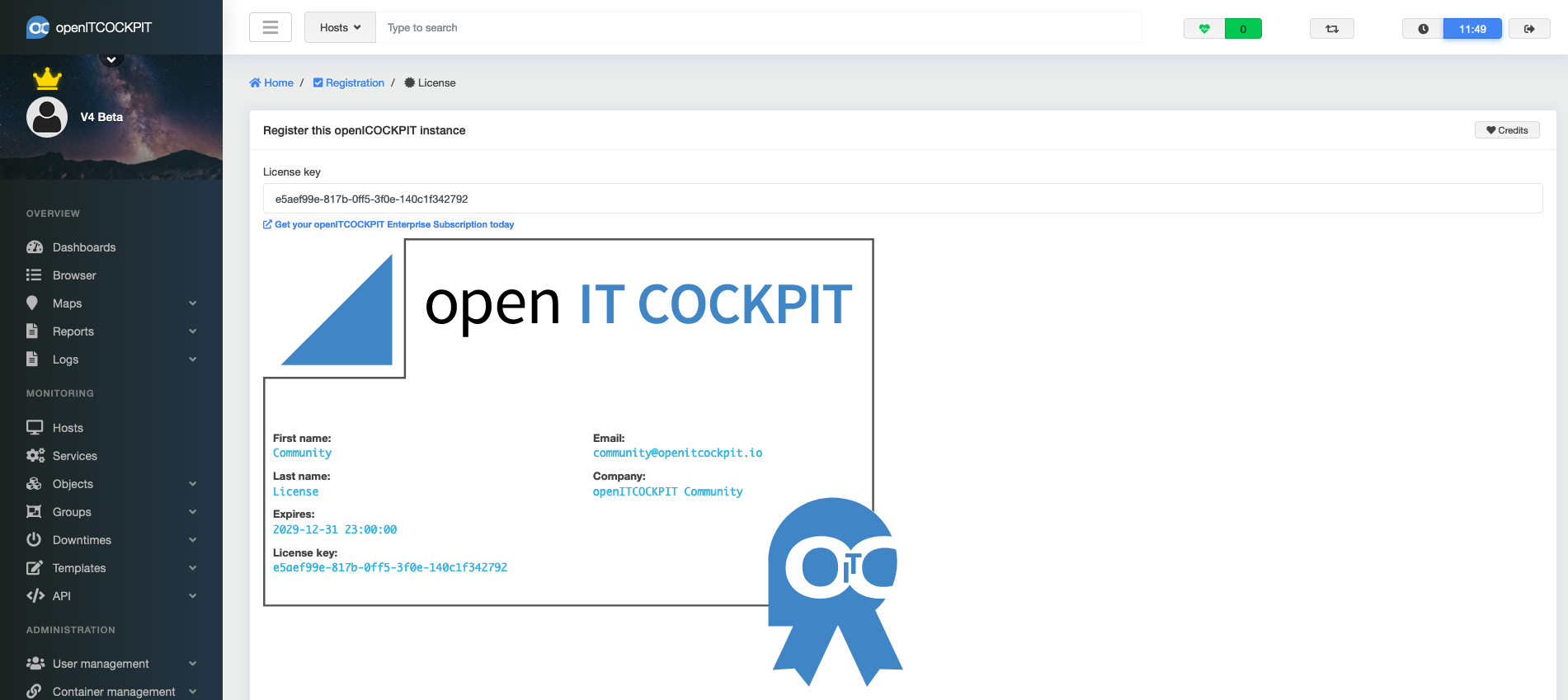Installation¶
openITCOCKPIT is installed via the package manager of your respective Linux distribution.
Supported operating systems¶
- Ubuntu
- Noble (24.04)
- Jammy (22.04)
- Debian
- Bookworm (12)
- Enterprise Linux
- Red Hat 8
- Red Hat 9
arm64 / Raspberry Pi¶
openITCOCKPIT and all components are also available for arm64 processors and the Raspberry Pi.
The installation is the same as for a 64-bit system with an AMD or Intel processor. If you want to use a Raspberry Pi system, the 64-Bit version of the Raspberry Pi OS must be used.
Adding the repository¶
Ubuntu¶
add-apt-repository universe
apt-get install apt-transport-https curl gnupg2 ca-certificates
mkdir -p /etc/apt/keyrings
curl https://packages5.openitcockpit.io/repokey.txt | tee /etc/apt/keyrings/openitcockpit-keyring.asc
echo "deb [signed-by=/etc/apt/keyrings/openitcockpit-keyring.asc] https://packages5.openitcockpit.io/openitcockpit/$(lsb_release -sc)/stable $(lsb_release -sc) main" > /etc/apt/sources.list.d/openitcockpit.list
apt-get update
Debian¶
Ensure you have enabled contrib and non-free repositories in /etc/apt/sources.list.d/debian.sources
Types: deb deb-src
URIs: mirror+file:///etc/apt/mirrors/debian.list
Suites: bookworm bookworm-updates bookworm-backports
Components: main contrib non-free non-free-firmware
Types: deb deb-src
URIs: mirror+file:///etc/apt/mirrors/debian-security.list
Suites: bookworm-security
Components: main contrib non-free non-free-firmware
Enable openITCOCKPIT repository
apt-get install apt-transport-https curl gnupg2 ca-certificates
mkdir -p /etc/apt/keyrings
curl https://packages5.openitcockpit.io/repokey.txt | tee /etc/apt/keyrings/openitcockpit-keyring.asc
echo "deb [signed-by=/etc/apt/keyrings/openitcockpit-keyring.asc] https://packages5.openitcockpit.io/openitcockpit/$(lsb_release -sc)/stable $(lsb_release -sc) main" > /etc/apt/sources.list.d/openitcockpit.list
apt-get update
Installing openITCOCKPIT¶
Danger
openITCOCKPIT expecteds the Linux default umask to be set to 022 (default for most Linux distributions).
If you are unsure change the umask to 022 before you continue with the update.
umask 0022
The actual installation is carried out by executing the following command:
apt-get install openitcockpit
You will now need to perform the basic configuration. During this process, for example, the first user for the web interface will be created. The rest of the configuration is then carried out via the openITCOCKPIT web interface.
/opt/openitc/frontend/SETUP.sh
Registering the openITCOCKPIT Community Edition¶
This step is optional and voluntary. You can expand your openITCOCKPIT installation's range of functions through the addition of modules. Several are available for free. In order to gain access to the community modules, you must first enter the openITCOCKPIT community key. To do this, click on System -> Registration and insert the following key: e5aef99e-817b-0ff5-3f0e-140c1f342792.
No further information is required.
After being successfully activated, the community modules will be available under System Tools -> Package Manager.
Installing phpMyAdmin¶
This step is optional and voluntary. The openITCOCKPIT system uses a MySQL database. Generally speaking, end users will not directly interact with the database. Experienced users, however, can install the phpMyAdmin tool for managing the database.
apt-get install phpmyadmin
The web server will be configured automatically. The phpMyAdmin interface can then be reached via https://xxx.xxx.xxx.xxx/phpmyadmin.
System requirements¶
- Ubuntu Linux 64 bit, Debian Linux 64 bit, RHEL 64 bit
- 2 CPU cores (x86-64 or arm64)
- 4 GB RAM
- 60 GB of free hard disk space
